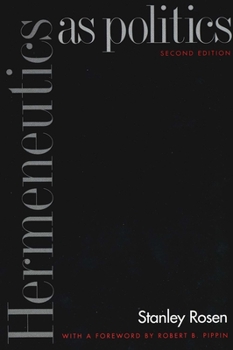Hermeneutics as Politics: Second Edition
Select Format
Select Condition 
Book Overview
Hermeneutics as Politics, perhaps the most important critique of post-modern thought ever written, is here reissued in a special fifteenth anniversary edition. In a new foreword, Robert B. Pippin argues that the book has rightfully achieved the status of a classic. Rosen illuminates the underpinnings of post-modernist thought, providing valuable insight as he pursues two arguments: first, that post-modernism, which regards itself as an attack upon the Enlightenment, is in fact merely a continuation of Enlightenment thought; and second, that the extraordinary contemporary emphasis upon hermeneutics is the latest consequence of the triumph of history over mathematics and science. "Perhaps the most original and philosophically important critical account of hermeneutics--of its philosophical status and historical development--to appear since Gadamer's Truth and Method."--Choice "A philosophical polemic of the highest order written in a language of unfailing verve and precision. . . . It will repay manyfold the labour of a slow and considered reading."--J. M. Coetzee, Upstream
Format:Paperback
Language:English
ISBN:0300099878
ISBN13:9780300099874
Release Date:March 2003
Publisher:Yale University Press
Length:240 Pages
Weight:0.70 lbs.
Dimensions:0.7" x 5.9" x 8.1"
Customer Reviews
2 ratings
A Timely Reminder
Published by Thriftbooks.com User , 25 years ago
An interesting characteristic of North American academia is its strange reluctance to accept a political role. Thus, the discomfort evident when trying to explain the obvious political heritage and tone of continental philosophers such as Heidegger, Sartre, or Derrida. Somehow, we imagine that the academic world is not to be "sullied" by such pedestrian concerns as politics. Consequently, Americans and Canadians both have misunderstood how profoundly political post-modernism is in its most basic tenets.Here, from Stanley Rosen, comes a timely reminder of this, and a hard-headed and tactical one at that. While some may take exception (I did) to the unnecessarily strident tone of argument employed here, there is no doubt that Stanley Rosen's analysis of post-modern hermeneutics from a politico-historical perspective is nothing short of brilliant. This is not a philosophical text for those who prefer to evade debate, or shrink away from conflict.However, aside from the often unnecessary "bran" in many of his arguments, there is an incredibly studied, deeply knowledgeable mind at work here. His obvious mastery of material outweighs the often reactionary aspects of his writing. He appreciates the political nature of post-modernism, and clarifies it (and would probably like to convince us of certain of his own preferences regarding it). However, this is not the main thrust of the book.And, if you want to read a philosophical essay so insightful and cogent it will make the hairs on the back of your neck stand up, you must read his chapter "Platonic Reconstruction". It is worth the cost of the entire book.More Wanderings: http://www.broken-hill.net/wanderings/wander.html
A Timely Reminder
Published by Thriftbooks.com User , 25 years ago
An interesting characteristic of North American academia is its strange reluctance to accept a political role. Thus, the discomfort evident when trying to explain the obvious political heritage and tone of continental philosophers such as Heidegger, Sartre, or Derrida. Somehow, we imagine that the academic world is not to be "sullied" by such pedestrian concerns as politics. Consequently, Americans and Canadians both have misunderstood how profoundly political post-modernism is in its most basic tenets.Here, from Stanley Rosen, comes a timely reminder of this, and a hard-headed and tactical one at that. While some may take exception (I did) to the unnecessarily strident tone of argument employed here, there is no doubt that Stanley Rosen's analysis of post-modern hermeneutics from a politico-historical perspective is nothing short of brilliant. This is not a philosophical text for those who prefer to evade debate, or shrink away from conflict.However, aside from the often unnecessary "bran" in many of his arguments, there is an incredibly studied, deeply knowledgeable mind at work here. His obvious mastery of material outweighs the often reactionary aspects of his writing. He appreciates the political nature of post-modernism, and clarifies it (and would probably like to convince us of certain of his own preferences regarding it). However, this is not the main thrust of the book.And, if you want to read a philosophical essay so insightful and cogent it will make the hairs on the back of your neck stand up, you must read his chapter "Platonic Reconstruction". It is worth the cost of the entire book.More Wanderings can be found at broken-hill.net/wanderings/wander.html






